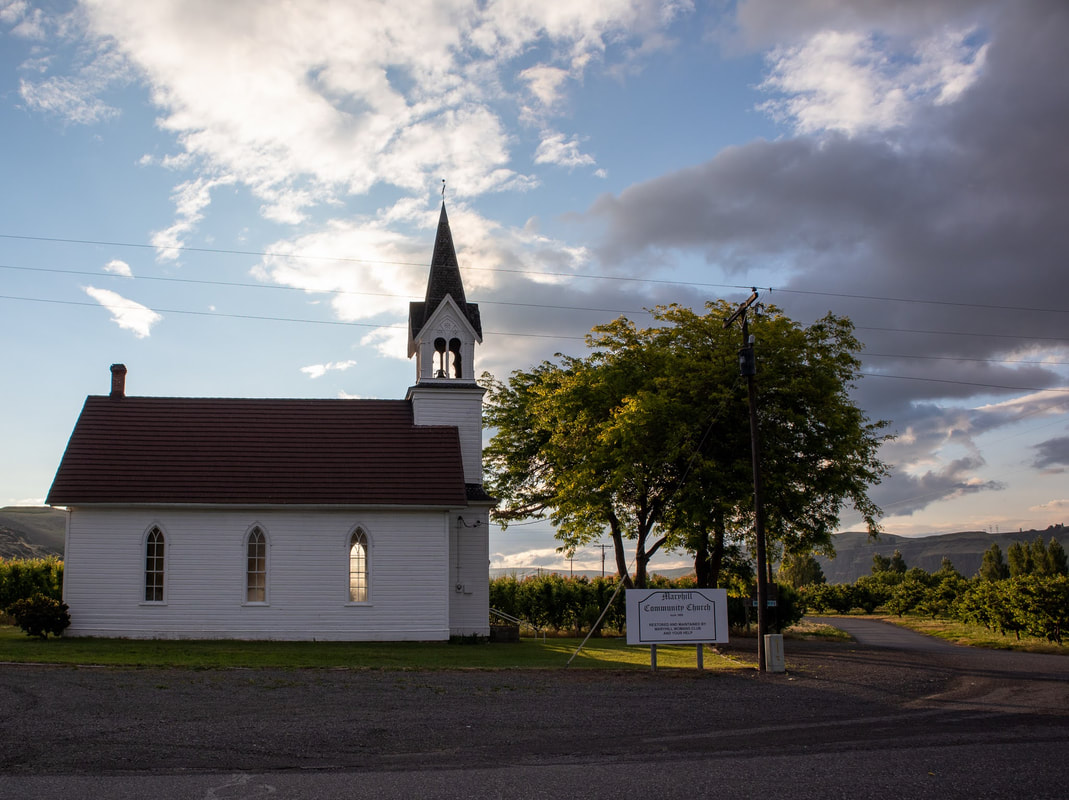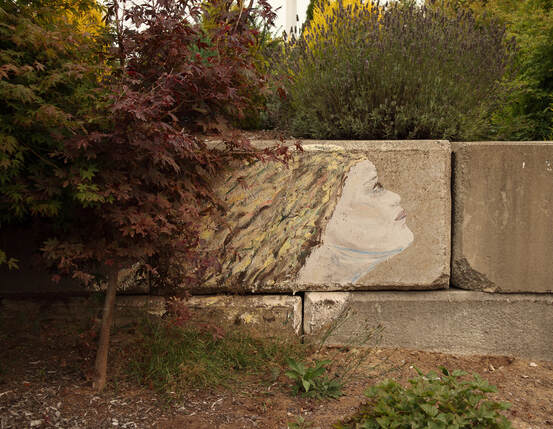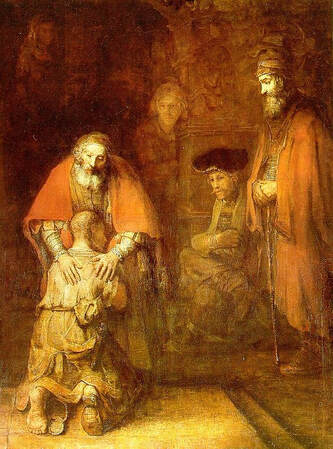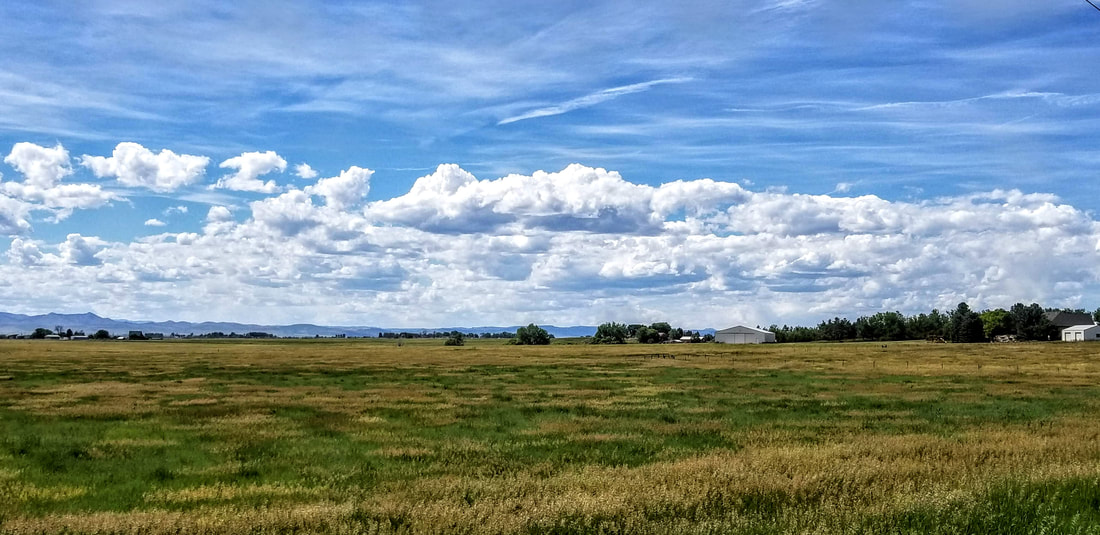|
A Meditation on Matthew 10:24-39 for St. David of Wales Episcopal Church
When I was in elementary school living in Southern California, I had to cross Pacific Coast highway to get to school. There was a bus stop at the signal where I waited for the crossing guard to usher me across when the light turned green, and on the bus stop bench was a billboard with a graphic of a four-person nuclear family: Dad, Mom, son, daughter, walking into a church and text that read, “The family that prays together stays together.” My family didn't go to church, and we didn't pray together, and we didn't stay together. But when I felt God pour into my life in my mid-twenties, I didn’t think about the bus stop promise; instead, I was terrified that I was supposed to give up all my possessions and become a nun in response, because even someone who didn’t know anything about God knew what God required of God’s followers. But I was married. A month after my twenty-first birthday, while we were both still in college, my husband and I tied the knot. Having lived through my parent’s divorce from each other, and their divorces from their second spouses, I had vowed never to divorce, so I was going to have to figure out how to follow Jesus without jilting my husband. Once I began going to church, I wanted the bus stop bench promise in my life. I wanted a life that was easy and perfect – which is what I thought happened when you became a believer. But I heard words like today’s gospel where Jesus says that he didn't come to bring peace, or to bring a happy little family that prayed together and stayed together. Jesus said he came to set family members against each other: parents against children and children against parents; stabbing at the heart of family relationships.
0 Comments
How do you say goodbye to those you love? How do you leave them empowered to carry on without you? How do you explain a future that has not yet happened? How do you share a vision you see so clearly with those who cannot fully grasp it?
These are the questions that run through my mind when I think about this scene in John's gospel. It's a continuation of Jesus speaking to his disciples at the Last Supper. These words come after Judas has fled the room. John 14 is the beginning of four chapters known as the farewell discourse. The discourse is the words that Jesus offers to comfort and reassure and prepare those he loves to continue this journey that they have been on together. A reflection on John 11:1-45 for St. David of Wales Episcopal Church, March 26, 2023
I have a clergy friend, Chris Hoke, whom I met in grad school when we were both earning our MFAs in Creative Writing. Chris is a pastor to gang members and his ministry began by corresponding with and visiting incarcerated gang members in Skagit County where he lives. As a result of the relationships he formed, he saw profound transformation when the men left jail and were given the opportunity to learn job skills at ministry supported Underground Coffee and leave behind gang life with continued relational support. His non-profit, Underground Ministries, has grown in the past decade and now is focused on growing the One Parish One Prisoner program, centered around the story of Lazarus as a metaphor for our prison system that entombs by incarceration. A system that often imprisons without trial, that sees people as disposable, and sentences them to live in cages nearly as lifeless as a tomb. Mass incarceration impacts our entire society, especially those whose loved ones are locked up, who grieve and mourn physical absence and the difficulty of maintaining relationships in such circumstances. A meditation on Luke 24:36-44, for the St. David of Wales community; First Sunday of Advent.
“But understand this: if the owner of the house had known in what part of the night the thief was coming, he would have stayed awake and not have let his house be broken into.” ––Matthew 24:43 One night when I was seven, I woke up in my bunk bed to hear a burglar in my house. My father worked late shifts patrolling the streets of Los Angeles as a deputy sheriff, and my mother usually stayed up very late to wait for him. But that night when I woke up, all the lights were off and I knew my mom was asleep and I knew my dad wasn't home, and I knew we were in the realm of the witching hour––that time between midnight and dawn when bad things happened that I had been warned about. I laid in bed frozen, heart pounding wildly, afraid to make a sound as I heard the burglar open the refrigerator. The burglar was stealing our food! Then I heard rattling in the kitchen cabinets. The burglar was stealing our dishes! Later I heard a sink run and a toilet flush. The burglar was in our bathroom, just down the hall from our bedrooms! My eyes were firmly shut so that the burglar would think I was asleep when he came into my room to steal my books and toys. I strained to hear more noises, but none came, and eventually sleep overcame my vigil. A meditation on Luke 18:1-8 for the community at St. David of Wales Episcopal Church, Shelton
What does it mean for us to pray like the widow? Because Jesus doesn't give any specific details in his parable, we're free to imagine whatever sort of widow we want. We can imagine, like one commentary I read, a weak little old lady leaning on her cane. A soft-spoken succinct woman who shows up every day with her plea down to one simple and sentence “I want my property restored to me,” and receives what she wants because of her faithfulness. In that scenario, we prayer is orderly, dignified, and quiet. However, in the dozens of commentaries I read, a different view of the widow prevailed. Writing in his book The Cultural World of Jesus, biblical scholar John J Pilch helps set the context for this parable by saying that the word widow in Greek meant one who has no voice. A widow would usually have a male relative speak on her behalf because she had no rights for property or inheritance. But this widow doesn't have a male figure to advocate on her behalf. She is speaking on her own behalf, demanding justice. Pilch notes that she was not speaking in private at judge’s chambers as we might imagine today. She was confronting the judge in a very public forum in front of other people, and that the judge’s failure to act would bring shame upon him. A reflection on Luke 10 for St. David of Wales, July 3, 2022
Three years ago, I had the opportunity to preach on this gospel passage. It was my fourth message for St. David’s, and I must admit, reading back on what I shared with you then as I tried to imagine myself in the shoes of the 70 sent out by Jesus, I was a little obsessed with not being able to take my giant purse and all its creature comforts, as well as how I was going to eat when people were going to try to poison me with gluten. Three years later, believe it or not, this is my 34th message at St. David’s. In those three years I’ve come to know this faith community better; I’ve come to know our wider community better; and my faith has continued to grow as I deepen my relationship to the Episcopal faith and to this beloved community. When I preached on this originally, I approached it from the context of a modern-day believer reading literally, trying to figure out what all these instructions meant for me in the 21st century. I don't know if I failed to consult a commentary or any other resources to get some biblical background information or if I just followed my mind down a rabbit hole. A message for the community of St. David of Wales, June 2022.
I used to love Pentecost and the images of fire, the tongues of flame hovering over the disciples’ heads. I wrote poetry about the hot breath of God on our faces, the spirit scorching our hair and singeing off our eyebrows and throwing us into the street chased by tongues of flame. Back then, I was a stay-at-home mom, a classroom volunteer, a Sunday school teacher with a tiny life and small circle of influence, who had just felt a call from God to write as a form of ministry. I found myself on fire for God in ways that burned up all my earlier doubts and fears about being the right kind of believer. And the idea of Pentecost coming to set us on fire, to clean us to bone and sinew, felt absolutely right as I opened myself up to new bold ways of being in the world. That was more than twenty years ago, when the worst thing I could imagine happening to my children in their classrooms was contracting head lice, not being fired upon. That was decades before COVID trapped us all in our own houses for months, long before I understood systemic racism and my privilege as a white woman. A message for the community of St. David of Wales on Good Friday, April 15, 2022.
I confess that I have never wanted to call this day “good,” that the crucifixion leaves me heartbroken, despite knowing what comes next. I have imagined, time and again, a different story that didn’t require death. Each year as our Holy Week journey takes us closer to the cross, I have hoped against hope that just this once, events would unfold differently, that history would be rewritten, that the powers of church and state would surrender themselves to the radical power of love that Jesus professed and embodied. I have wanted alternative scriptures where, having fully instituted God’s will on earth as in heaven, Jesus retires to Galilee, resumes carpentry, marries, raises a family, and lives to a ripe old age. A Message on Luke 15: The Parable of the Prodigal Son for the community at St. David of Wales, March 27, 2022
In the New International Version, and many others, this morning’s lesson from Luke is titled “The Story of the Lost Son.” In the Expanded Bible it’s “The Son Who Left Home.” The New Testament for Everyone labels it, “The Parable of the Prodigal: The Father and the Younger Son.” In the Contemporary English Version, the title reads “Two Sons.” And finally, the New Revised Standard Version follows suit with “The Parable of the Prodigal and His Brother.” No matter how we refer to it, this longest of Jesus’ parables which appears only in Luke’s gospel, has resonated deeply over the centuries, perhaps more than any other story Jesus told. And it still speaks to us in circles far beyond the church. Even as a secular child, I’d heard of the prodigal son—and even without knowing that the word prodigal (it’s something like recklessly wasteful), I knew the son was up to no good. A Message delivered to St. David of Wales Episcopal Church on Luke 6:17-26
Luke’s gospel leaves no doubt that Jesus has come to turn the powers of the world upside down. When our readings for this liturgical year turned to Luke’s gospel in Advent, we heard the promises of God’s plan through the song of Mary. Upon learning that she would give birth to the Messiah, Mary—an unwed teen in occupied territory—proclaimed that she had found favor with God, that God had lifted up the humble, and fed the hungry, while casting down the powerful and sending the rich away hungry. A few weeks ago, when we read of Jesus beginning his public ministry, we found him in his hometown synagogue reading from the scroll of Isaiah and proclaiming that he was the one sent to free the oppressed. And in this morning’s gospel lesson, Jesus offers blessings to “comfort the afflicted” and woes “to afflict the comfortable” as the saying goes. |
I began blogging about "This or Something Better" in 2011 when my husband and I were discerning what came next in our lives, which turned out to be relocating to Puget Sound from our Native California. My older posts can be found here.
Categories
All
Archives
September 2023
Newsletters |










